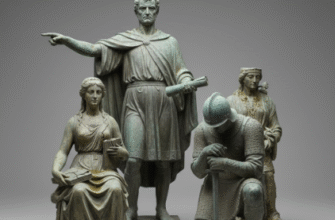Few stories have echoed through the halls of history quite like the tale of the Trojan War. It’s a foundational epic of Western literature, a sprawling narrative brimming with gods and mortals, heroes and villains, love and betrayal. For centuries, it was simply accepted as history, then dismissed as pure myth. Today, we understand it as a complex tapestry woven from threads of both historical memory and poetic imagination. It’s more than just a war story; it’s an exploration of human nature itself—our pride, our rage, and the catastrophic consequences of our choices.
The entire cataclysm, a decade of bloodshed that would topple a great city, began not on a battlefield, but at a wedding feast. When the goddess of discord, Eris, was snubbed an invitation to the marriage of the mortal Peleus and the sea-nymph Thetis, she exacted her revenge with a single, perfect act of chaos: a golden apple tossed among the guests, inscribed with the words “For the Fairest.” Three powerful goddesses—Hera, queen of the gods; Athena, goddess of wisdom and war; and Aphrodite, goddess of love—each laid claim to it. To settle the matter, Zeus appointed a mortal judge, Paris, a handsome prince of Troy who had been raised as a shepherd.
A Fateful Judgment and a Stolen Queen
Each goddess attempted to bribe the young prince. Hera offered him dominion over all of Asia. Athena promised him unmatched wisdom and glory in battle. But Aphrodite’s offer was the one that ensnared Paris’s heart: she promised him the love of the most beautiful mortal woman in the world, Helen. Paris, led by desire, awarded the golden apple to Aphrodite, an act that would seal his city’s doom. The problem was that Helen, Queen of Sparta, was already married to King Menelaus.
Under the guise of a diplomatic visit, Paris traveled to Sparta, where he was welcomed as a guest. When Menelaus was called away, Paris violated the sacred laws of hospitality, persuading Helen to abandon her husband and her home, and absconded with her back to the mighty walled city of Troy. Whether she went willingly as a lover or was taken by force as a captive remains one of the story’s great ambiguities. Regardless of her motive, the result was the same: an unforgivable insult to Menelaus and a challenge to the honor of all the Achaean (Greek) kings.
The Launch of a Thousand Ships
Menelaus’s brother, Agamemnon, the powerful king of Mycenae, saw this not just as a family crisis but as a political opportunity. He invoked the Oath of Tyndareus, a pact sworn by all of Helen’s former suitors to defend her marriage. Kings and heroes from all corners of Greece were summoned to fulfill their pledge. A legendary fleet, famously described as “a thousand ships,” was assembled at Aulis to sail for Troy and bring Helen back, by force if necessary.
This was no ordinary army. It was a league of legends. It included the cunning Odysseus, king of Ithaca; the mighty Ajax, a giant of a man second only to one in fighting prowess; and the greatest warrior of them all, the swift-footed and seemingly invincible Achilles, son of the very goddess Thetis whose wedding started the trouble. The stage was set for a conflict of epic proportions.
A Decade of Bloodshed and Stalemate
The Greeks landed on the shores of Troy, but the city, protected by its formidable walls, was not easily taken. What was expected to be a swift campaign devolved into a grueling ten-year siege. The war was not a continuous battle but a series of skirmishes, duels, and raids, punctuated by long periods of stalemate. The gods themselves took sides, frequently intervening in the affairs of the mortals below, turning the tides of battle with their whims and rivalries. Athena and Hera sided with the Greeks, while Aphrodite, Apollo, and Ares favored the Trojans.
While the epic scale of Homer’s Iliad is mythological, archaeological evidence lends a core of truth to the tale. The site of Hisarlik in modern-day Turkey is widely accepted as the historical Troy. Excavations have revealed multiple layers of a city that was repeatedly destroyed and rebuilt, with one layer showing signs of a violent conflict consistent with the Bronze Age period in which the story is set.
The most famous account of the war, Homer’s epic poem the Iliad, focuses on a short but pivotal period in the final year of the siege. It revolves around the rage of Achilles, who withdraws from battle after a bitter dispute with Agamemnon. Without their greatest champion, the Greeks suffer devastating losses at the hands of Troy’s noble protector, Prince Hector. It is only the death of his beloved companion Patroclus that draws Achilles back to the fight, his grief transformed into a terrible, all-consuming fury. The subsequent duel between Achilles and Hector is the stuff of legend—a clash between the two greatest warriors of their age, culminating in Hector’s death and the desecration of his body, a shocking act even by the brutal standards of ancient warfare.
The Horse and the Fall
Even with Hector gone, Troy’s walls held firm. The Greeks realized that what they could not win with brute force, they might be able to win with cunning. It was the master strategist Odysseus who conceived of the war’s most iconic stratagem: the Trojan Horse. The Greeks constructed a colossal wooden horse and left it on the beach as a supposed offering to the gods for a safe voyage home. They then packed their camps and their fleet appeared to sail away in defeat.
Despite the dire warnings of the priest Laocoön and the prophetess Cassandra, the Trojans, euphoric in their apparent victory, dragged the massive statue into their city as a trophy. That night, as the Trojans celebrated, a hidden door in the horse’s belly opened. A select group of Greek warriors, led by Odysseus, crept out into the sleeping city, slaughtered the sentries, and opened the gates for their army, which had sailed back under the cover of darkness. The sack of Troy was brutal and absolute. The city was burned to the ground, its men killed, and its women and children taken into slavery. A great civilization was wiped from the earth in a single night of fire and slaughter. The war was finally over, but for the victorious Greeks, their journeys home would be just as perilous as the war itself, most famously chronicled in Homer’s other great epic, the Odyssey.








